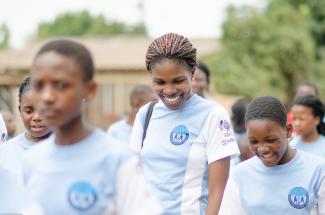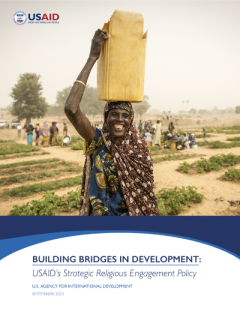Faith-based and community organizations are on the front lines of development and humanitarian assistance in every corner of the world. They offer perspectives that enable better understanding of community needs, hold positions of trust and leadership within societies, and can serve as effective liaisons between citizens and governments in times of conflict and humanitarian crises.
Since its founding, USAID has partnered with and alongside faith-based and community organizations to advance shared development and humanitarian assistance objectives. These critical partnerships expand USAID’s opportunities to create and deliver sustainable, locally-led solutions within our broader development agenda.
The Center for Faith-Based and Neighborhood Partnerships (FBNP) works to build bridges between the Agency and faith-based and community organizations. With its mandate from President Biden’s February 2021 Executive Order establishing the White House Office of Faith-Based and Neighborhood Partnerships, FBNP reaffirms the U.S. Government’s longstanding commitment to work with faith-based and community organizations, including diaspora groups, volunteer networks, and foundations, to advance shared diplomatic, international development, and humanitarian goals worldwide.
Our Approach
In September 2023, the Agency released “Building Bridges in Development: USAID’s Strategic Religious Engagement Policy.” Grounded by a set of principles that shape the Agency’s commitment to our partnerships with religious actors, the first-of-its-kind policy provides USAID staff with a framework for engaging religious communities and faith-based organizations in every sector and region where USAID operates.
The policy was developed in direct response to requests from the USAID workforce for more guidance on when, where and how to engage faith-based partners. It is also responsive to the U.S. National Strategy on Religious Leader and Faith Community Engagement, which was adopted by the U.S. Government in 2013 and encourages U.S. diplomats and development professionals to engage and deepen relationships with religious leaders and faith communities as they carry out their foreign policy responsibilities. Since then, the U.S. Government has taken intentional steps to engage religious actors and partner with faith-based organizations, including through our development and humanitarian efforts around the world. USAID is proud to contribute to advancing this strategy with our first-ever strategic religious engagement policy.
FBNP strengthens the Agency’s work with faith-based and community organizations by:
Building Bridges:
Provide resources on how to work with USAID and connect these organizations with appropriate points of contacts within the Agency.
Convene faith-based and community organizations with USAID leadership via meetings and events to discuss shared priorities.
Strengthening Capacity:
- Provide USAID staff with data-driven tools and resources on Strategic Religious Engagement (SRE), FBNP’s model for working with local religious communities and partnering with faith-based organizations.
Advancing Policy:
- Gather and analyze data on the role and impact of engaging with religious communities and partnering with faith-based organizations.
- Represent USAID in interagency and international groups working at the intersection of religion and development.

USAID/Zimbabwe
Strategic Religious Engagement in Practice
Promoting Mutual Cooperation with Haitian and Dominican Border Communities
Learn how the USAID-funded, Communities Living Peacefully Project, implemented by Christian Aid, is strengthening the capacity of Haitian and Dominican border communities to address socioeconomic and environmental challenges.
Local Communities and Religious Leaders are Working Together to Address Gender-based Violence in Honduras
Honduran women face one of the highest rates of gender-based violence (GBV) in the Western Hemisphere. USAID is working with local organizations to train community and religious leaders on how to best respond to GBV cases and refer survivors to advanced support services, including safe spaces and centers for holistic services.
Advancing Land Restoration and Economic Opportunities Through Public-Private Partnerships
In Madagascar, harmful agricultural practices and increased demand for local products have led many farmers to look for sustainable alternatives to increase agricultural production. Through the Thriving and Sustainable Investments for Land Restoration and Economic Opportunity (TIRSO) program, Catholic Relief Services and an alliance of private sector partners are training local farmers on sustainable agroforestry and business practices to increase biodiversity and economic opportunities.
Training Local Imams to Raise Awareness for Tuberculosis Treatment in Tajikistan
According to the World Health Organization, Tajikistan has one of the highest rates of Tuberculosis in the world. Through the USAID End TB Tajikistan Activity, FHI 360 works with local partners to equip local imams and community health workers with knowledge, tools and skills to educate their communities, refer patients for treatment, and support eliminating TB in Tajikistan.
News and Updates
Sign up for the Center for Faith-Based and Neighborhood Partnerships’ monthly newsletter to stay up to date on new resources, tools, and funding opportunities. Subscribe here.





